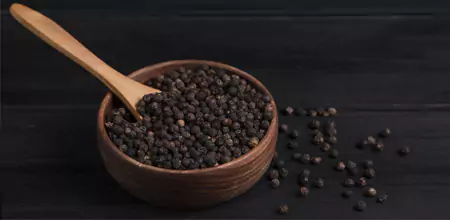Known for its sharp, mildly spicy flavor and pungent aroma, black pepper has been a staple in kitchens for centuries.
But beyond its role as a flavor enhancer, black pepper holds a treasure trove of health benefits backed by both traditional wisdom and modern research.
Origins and History of Black Pepper
Native to the Malabar Coast of India, black pepper has a rich history dating back over 4,000 years.
Ancient traders valued it so highly that it was often referred to as “black gold” and even used as currency in some parts of the world.
Pepper played a crucial role in global trade routes, connecting India to Europe, the Middle East, and beyond.
Nutritional Profile
Black pepper is more than just a seasoning; it contains essential vitamins, minerals, and bioactive compounds that contribute to health and wellness.
The star compound is piperine, which gives pepper its distinct taste and offers numerous medicinal properties.
- Rich in antioxidants
- Contains vitamins A, C, and K
- Provides minerals like calcium, potassium, and iron
- Contains dietary fiber to aid digestion
Health Benefits of Black Pepper
1. Boosts Digestion
Piperine stimulates the stomach to produce more hydrochloric acid, which aids in breaking down proteins and improving digestion.
Regular use in moderate amounts can help prevent indigestion, bloating, and gas.
2. Enhances Nutrient Absorption
One of black pepper’s most unique benefits is its ability to increase the bioavailability of nutrients.
Piperine helps the body absorb vitamins and minerals more effectively, making it an excellent companion for nutrient-rich foods.
3. Supports Weight Management
Piperine may help in breaking down fat cells and boosting metabolism, which supports weight loss efforts when combined with a healthy diet and exercise.
4. Powerful Antioxidant Properties
Black pepper is packed with antioxidants that help fight free radical damage in the body.
This reduces oxidative stress, which is linked to premature aging and chronic diseases.
5. Improves Brain Health
Piperine has been studied for its potential to improve cognitive function and protect against neurodegenerative diseases.
It may enhance memory, focus, and overall brain performance.
6. Supports Respiratory Health
In traditional medicine, black pepper is often used to relieve coughs, colds, and sinus issues.
Its warming nature can help break down mucus and clear the respiratory tract.
Culinary Uses of Black Pepper
Black pepper’s versatility makes it a staple in cuisines around the globe.
From soups and salads to meat dishes and desserts, it adds depth and complexity to flavors.
- Sprinkled over eggs, salads, and pasta
- Used in spice blends like garam masala and pepper steak seasoning
- Paired with turmeric to enhance anti-inflammatory benefits
- Added to teas or warm water for respiratory relief
How to Store Black Pepper
To preserve flavor and potency, store whole peppercorns in an airtight container away from sunlight and heat.
Grinding pepper fresh just before use ensures the best flavor and maximum health benefits.
Precautions and Considerations
While black pepper is safe for most people, excessive consumption may cause stomach irritation in some individuals.
Those with ulcers, acid reflux, or certain medical conditions should use it in moderation.
Always consult a healthcare provider if you are on medication, as piperine can interact with certain drugs.
Conclusion: Black pepper is far more than a kitchen essential—it’s a powerful natural remedy with a rich history and a bright future in health and wellness.
Adding a pinch of this humble spice to your daily meals can not only enhance flavor but also offer long-term health benefits.
